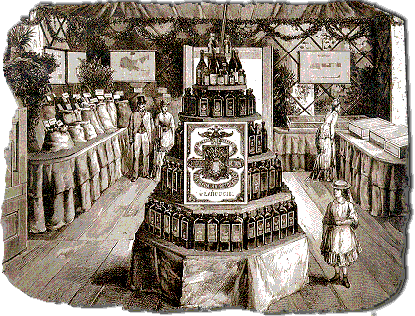|
|
![]() the
distillery history
the
distillery history
![]() the
museum
the
museum

DISTILLATION of vodka was well known and widespread in Poland as early
as the sixteenth century. Documents surviving from that time contain much
information on it, even giving detailed formulas. The names "vodka" and "spirits"
were used in Poland more than four hundred years ago.
Vodka distillation in the Middle
Ages was very primitive, and the product was low proof. Triple distillation
began in the eighteenth century, yielding a product called okowita When
you know that the Polish "w" sounds like a "v", it is easy to see that the word
is aqua vitae rendered in Polish. Okowita was 70-80% alcohol.
Through dilution with water, different kinds of 60-70 proof vodkas for shops and
inns were obtained. Better, stronger vodka was produced by further distilling
diluted okowita in an alembic, the method of those days.
The spirits which had been produced in the homes of nobles and in monasteries in
medieval times began to be made on an industrial scale in the eighteenth century.
Jan Baczewski founded the first liqueur distillery in 1782 in Lvov.
Political and economic factors were behind the growth of the distillation
industry in Galicia in the eighteenth century. The partitioning of Poland cut
off former markets and created the need to use surplus grain previously exported.
A great number of flavoured spirits distilleries appeared, large and small.
Between the world wars, unflavoured vodka production expanded under the
supervision of the State Alcohol Monopoly. Strong competition reduced the number
of distilleries.
The People's Republic of Poland nationalised the alcoholic beverage industry and
concentrated it in seventeen large plants manufacturing a broad assortment of
unflavoured and flavoured spirits. The quality remained competitive, earning
gold medals and distinctions at international trade fairs and exhibitions,
although there was somewhat of a break from pre-war traditions.
In 1991 the Polmos association of distillery enterprises ceased to exist.
In its place, nineteen state-owned enterprises were created, each inheriting
the Polmos name and sharing
brands. Competition between producers has led to the creation of many
new brands differing only in their labels.
An undoubted benefit of the dissolution of Polmos however, is the fact that
producers have begun to place great stress on quality since they now bear full
responsibility for their balance sheets.
Intense competition has been good for the industry's development as a whole.